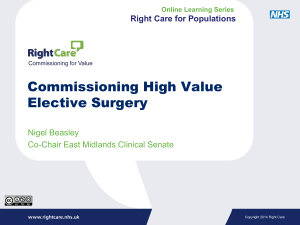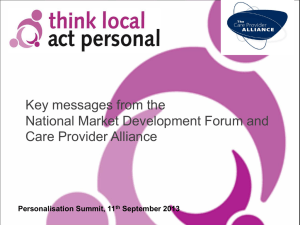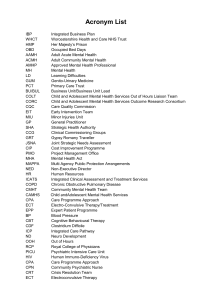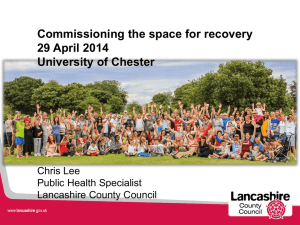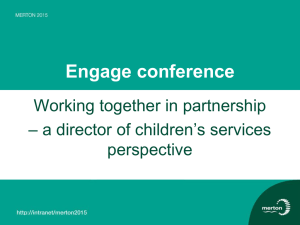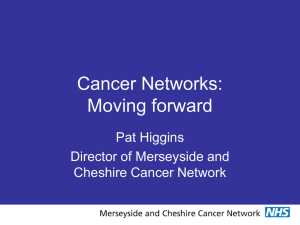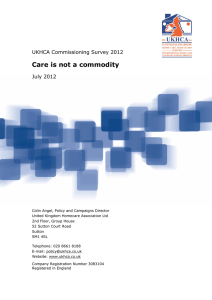Presentation
advertisement
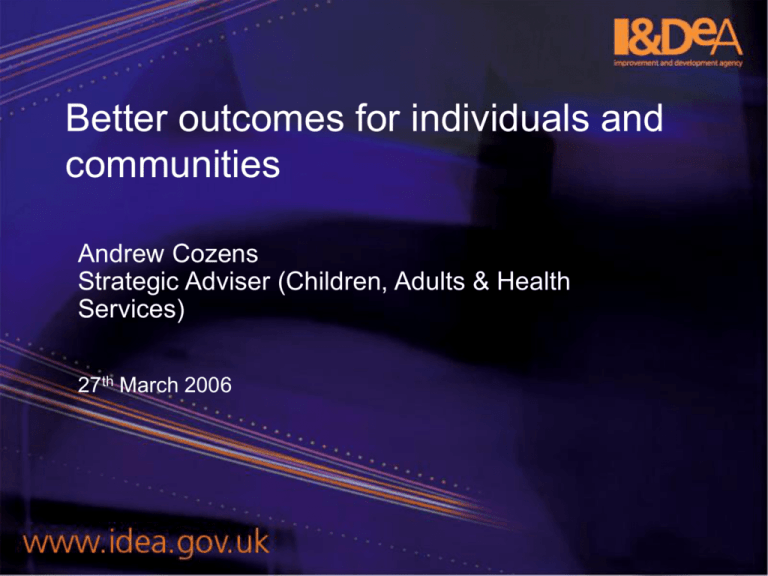
Better outcomes for individuals and communities Andrew Cozens Strategic Adviser (Children, Adults & Health Services) 27th March 2006 Summary • Outline the state of social care • Review the leadership challenges of improving outcomes of the White Paper. • Outline the basis of an approach to improvement • Outline IDeA work programmes on Adult Social Care and Public Health • More information on www.idea.gov.uk/knowledge/healthiercommunities Definitions • Health care – the treatment of sick people • Social care – the support of people with dependencies and their carers • Health improvement – helping people to keep healthy • Health inequalities – inequity in access and outcomes • Well-being – physically, emotionally, economically at ease and in control; family, work, community • Community development – involvement of people in communities in exercising choice and control. The state of social care • Many people, both adults and children, do not qualify for services because of high thresholds set for them. • Councils are concentrating on developing services for those with the highest and most complex needs. • In children’s services, the drive to integration has resulted in a decline in good performance in some councils. • Younger people with disabilities are losing out from current models of care. The state of social care • Support for carers is lacking. • People have difficulty finding services, particularly if they are paying for them. • Services run by the voluntary sector significantly outperform those run by councils and the private sector. • Good management makes a difference to performance. (CSCI Report on the State of Social Care December 2005) The broader context for the White Paper • Strategic shifts from structures: – Joint working (JCCs/Joint Finance) – Integration (care trusts) – Co-delivery (Choosing Health) • To Partnerships – Greater integration of commissioning and delivery – Local Area Agreements – Double Devolution – Practice based commissioning Infrastructure implications • Steps to bring the infrastructure of local government and the NHS closer together: – Reorganisation of PCTs. – Greater engagement of PCTs in local strategic partnerships. – Use of local area agreements to improve health outcomes in local communities. – Steps to align budget and planning cycles. – Consideration of social care presence in Government Offices of the Regions. – Rearranged performance assessment to support the outcomes framework needed. Commissioning implications • Commissioning – Shift in funding from hospital to community services. – Greater and more systematic use of Health Act flexibilities. – Practice based commissioning – Greater diversity of providers. – Greater use of community and voluntary organisations. – More support for carers – nominated leads. The partnership context • • • • • • • • Aligning Performance Management and Inspection Integrating governance Local strategic partnerships Joint Outcomes Local Area Agreements Neighbourhoods and communities Aligning Budget Cycle Strategic Needs Assessment Joint Commissioning Framework Practice based commissioning Direct payments/Individualised budgets Workforce Unbundled tariffs (care tariff?) Joint teams (Personal health & social care plans) Joint infrastructure (capital/market) Joint Electronic records Improvement framework • Shared endeavour nationally: – Councils, Government, regulators, auditors • Six dimensions to improving public services: – Community leadership and partnership – Political leadership – Strategic commissioning – Performance management – Workforce reform – Communities and neighbourhoods (Audit Commission) Improvement framework • An adult services “onion”: – – – – – Better outcomes for individuals Delivery Infrastructure and organisation Integrated governance and strategy Better lives for people in communities The improvement cycle • Strategic needs analysis • Prioritisation and Local Area Agreements • Planning • Commissioning and Delivery • Self-Evaluation Dimensions of an adult social care approach • • • • • • • • • • Universal, targeted or specialist Fair Access to Care Promoting independence choice and control Carers Community and neighbourhoods Managing the market Diversity of providers Efficiency Individualised budgets Brokering services from other parts of the statutory sector • Self-funders Missing but presumed • Outcomes framework • Integrated inspection framework • Revised Performance Management framework • Government Office role • Judgements of progress • Implications for the CPA and other partners’ performance The IDeA work programmes Adult Social Care • • • • • • • • • National Leadership Academy Local Leadership Academy Regional Events National Conferences for Leaders and Chief Executives Lead Member Networks Top Team Development Peer Review Service Advisers Tailored support for Challenged Councils The IDeA work programmes Public Health • Programme of improvement and development activity to enhance the capacity of local government to improve public health and reduce health inequalities: – – – – – – – DASS/DPH Strategic Needs Assessment Leadership capacity and networks Knowledge and information sharing Peer review Work with Spearhead Councils and PCTs Working with employers Links with Adult Social Care, Social Regeneration, Housing, Leisure and Sport Better outcomes for individuals and communities Andrew Cozens Strategic Adviser (Children, Adults & Health Services) 27th March 2006
